“A Quiet, Secluded Little Miracle”*
Some Remarks on the Territorial System and Landscape of Central Apulia Twenty Years After the European Landscape Convention
DOI:
https://doi.org/10.14195/1647-8681_11_12_4Resumo
Twenty years after the European Landscape Convention, considering the evolution of Italian law, the landscape plan of Regione Puglia’s is a case of interest for the implementation instruments adopted for governance of the territory. The focus of this paper is the area of the Archaeological Park of Egnazia, a major reference point of historical and cultural interest, along a charming section of coast. Along the interdisciplinary interpretation of this wide area, the second part of the contribution attempts to provide a synthesis of the philosophy and methodology behind the choice and adoption of the cognitive tools which technically and operatively inform the Landscape Plan. This plan holds together the requirements of the European conventions and the indications of the Italian Code, within a composite context. Finally, some considerations are presented on the meanings of landscape in Europe, at a time of the globalization crisis and climate change.
Downloads
##submission.downloads##
Publicado
Edição
Secção
Licença
Direitos de Autor (c) 2021 Davide Falco

Este trabalho encontra-se publicado com a Licença Internacional Creative Commons Atribuição 4.0.
Acesso Livre
Autores que publicam nesta revista concordam com os seguintes termos:
a. Autores conservam os direitos de autor e concedem à revista o direito de primeira publicação, com o trabalho simultaneamente licenciado sob a Licença Creative Commons Attribution que permite a partilha do trabalho com reconhecimento da autoria e publicação inicial nesta revista.
b. Autores têm autorização para assumir contratos adicionais separadamente, para distribuição não-exclusiva da versão do trabalho publicada nesta revista (ex.: publicar em repositório institucional ou como capítulo de livro), com reconhecimento de autoria e publicação inicial nesta revista.
c. Autores têm permissão e são estimulados a publicar e distribuir o seu trabalho online (ex.: em repositórios institucionais ou na sua página pessoal) a qualquer ponto antes ou durante o processo editorial, já que isso pode gerar alterações produtivas, bem como aumentar o impacto e a citação do trabalho publicado (Veja O Efeito do Acesso Livre).





